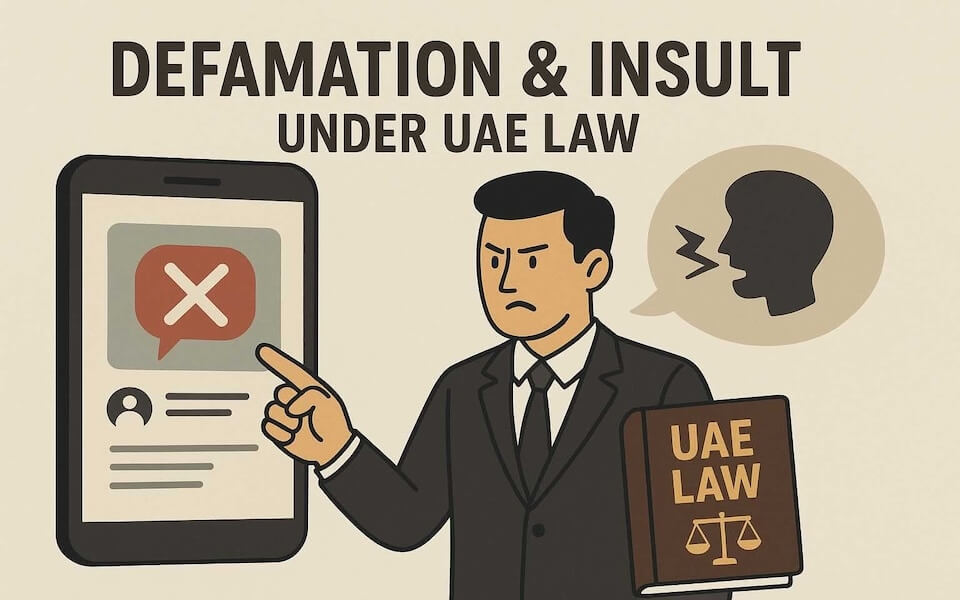المدونة القانونية
Defamation & Insult Under UAE Law: What You Need to Know in the Digital Age

Unlike many countries where defamation is a civil issue, the United Arab Emirates treats it as a criminal offense, with strict laws protecting personal dignity and reputation. Understanding these laws is essential before you vent online in the UAE.
Defamation vs. Insult: Criminal Offenses in the UAE
In plain English, defamation means making false statements that harm someone’s reputation. This can be written (libel) or spoken (slander). An insult is using offensive or disparaging language that injures a person’s honor or dignity. UAE law makes no distinction between public figures and private individuals when it comes to these offenses – damage is damage.
What might be “free speech” elsewhere can be a crime here. From my experience with defamation claims in the UAE, intent is not always required. Even if you believed your comments or were just voicing an opinion, you can still be held liable if the effect is to defame or insult someone. In the UAE’s legal culture, protecting a person’s honor and reputation is paramount.
UAE Legal Framework: Penal Code and Cybercrime Law
The UAE Federal Decree-Law No. 31 of 2021 (the “Penal Code”) makes defamation and insult criminal offenses. The relevant articles are:
Article (425) - Defamation (Qazf) Any person who, by any of the means of publicity, attributes to another person an incident that would subject him to punishment or disdain shall be punished by imprisonment for a period not exceeding (2) two years or by a fine not exceeding (20,000) twenty thousand Dirhams. The penalty shall be imprisonment and a fine, or either of these two penalties, if the defamation is committed against a public employee or a person entrusted with a public service during, because of, or in connection with the performance of his job or public service, or if it affects the honor or reputation of families, or if it is noted that an unlawful purpose is intended. If the defamation is committed by publication in a newspaper or any other publication, this shall be considered an aggravating circumstance.
Article (426) - Insult (Sabb) Any person who, by any of the means of publicity, attributes to another person anything that would violate his honor or reputation without including the attribution of a specific incident, shall be punished by imprisonment for a period not exceeding one year or by a fine not exceeding (20,000) twenty thousand Dirhams. The penalty shall be imprisonment for a period not exceeding (2) two years and a fine not less than (20,000) twenty thousand Dirhams and not exceeding (50,000) fifty thousand Dirhams, or either of these two penalties, if the insult is committed against a public employee or a person entrusted with a public service during, because of, or in connection with the performance of his job or public service, or if it affects the honour or reputation of families, or if it is noted that an unlawful purpose is intended. If the insult is committed by publication in a newspaper or any other publication, this shall be considered an aggravating circumstance.
Article (427) - Defamation or Insult by Phone or in Person Any person who commits defamation or insult by telephone, or in the presence of the victim and others, shall be punished by imprisonment for a period not exceeding (6) six months or by a fine not exceeding (5,000) five thousand Dirhams. The penalty shall be a fine not exceeding (5,000) five thousand Dirhams if the defamation or insult is committed in the presence of the victim without the presence of others, or in a message sent to him by any means. It shall be considered an aggravating circumstance if the defamation or insult is committed in the cases set out in the two preceding paragraphs against a public employee or a person entrusted with a public service during, because of, or in connection with the performance of his job or public service, or if it affects the honor or reputation of families, or if it is noted that an unlawful purpose is intended.
Note on Defense: Notably, the new Penal Code allows a limited defense in such cases: if you accuse a public official and prove the truth of the allegation and that it relates to their job, you might avoid liability. But outside this narrow exception, “truth” is generally not an absolute defense in UAE criminal defamation cases.
It’s important to understand that criminal defamation does not require widespread media publication. Speaking slander in front of witnesses or posting it on a platform visible to others is enough. Group WhatsApp chats and public Facebook posts qualify.
Cybercrime Law: Harsher Penalties for Online Defamation
Federal Decree-Law No. 34 of 2023 on Combating Rumors and Cybercrimes applies when defamation occurs online. The relevant article is:
Article (43) - Defamation and Insult via Information Network Any person who insults another or attributes to him an incident that would make him subject to punishment or disdain by others, using an information network, an information technology means, or an information system, shall be punished by imprisonment and a fine not less than (250,000) two hundred and fifty thousand Dirhams and not exceeding (500,000) five hundred thousand Dirhams, or by either of these two penalties. If any of the acts mentioned in the first paragraph of this Article are committed against a public employee or a person entrusted with a public service during, because of, or in connection with the performance of his job, this shall be considered an aggravating circumstance for the crime.
Expatriates convicted under this law may also face deportation.
Courts view social media as highly public. A WhatsApp message or Facebook post can be forwarded indefinitely. In several cases I’ve advised on, this viral potential contributed to harsh sentencing.
Judges may also order:
- Confiscation of devices used
- Deletion of posts
- Closure of social media accounts
Admins of websites or pages can be held liable for defamatory content published by others if they fail to remove it promptly.
Real UAE Cases: When Reviews Turn Criminal
- Instagram Hospital Complaint: A Dubai woman posted complaints on Instagram about her mother’s treatment in a hospital, calling it "the worst hospital." The hospital filed a complaint. She was fined AED 5,000 and ordered to delete the post.
- Google Review of a Clinic: In 2023, a man posted a negative review accusing a nurse of incompetence and substance abuse. The court fined him AED 5,000, confiscated his phone, and ordered the review removed.
- Ex-Employee’s Angry Review: A British expat posted a scathing Google review about his former employer. Even after deleting it, he was arrested at the airport on his return to Dubai and faced trial.
- WhatsApp Insults: A woman in Abu Dhabi insulted a colleague via WhatsApp and was fined. In another case, a family dispute escalated to an AED 500,000 fine for insulting messages that crossed into hate speech.
- Twitter Spat: A heated argument between several individuals on Twitter resulted in four people being sentenced to jail for exchanging public insults. Courts emphasized that social media is not a private space.
These cases illustrate that the UAE has a zero-tolerance stance on defamatory or insulting speech, especially online. Even ordinary people have faced criminal action for a bad review or an angry comment. Apologizing afterward or claiming you only shared an opinion will not necessarily shield you. The courts focus on the effect of the words on the victim’s reputation, not just the speaker’s intent.
Legal Consequences: More Than Just Fines
Convictions result in criminal records. Fines can reach AED 500,000. Courts may also:
- Confiscate phones/laptops
- Suspend internet use
- Order social media account closures
Deportation is common for expatriates. The process can involve travel bans, detainment, and reputational damage even before verdicts are issued.
It is also crucial to note that a criminal conviction does not preclude the victim from filing a separate civil lawsuit (Civil Damages) to seek financial compensation for the harm and losses caused by the defamation or insult. This means the offender may face both criminal penalties (fines, imprisonment) and civil liability (compensation).
Tips for Individuals: Posting Reviews Safely
- Stick to Facts: Share your experience without exaggeration or insults.
- Use Respectful Language: Avoid profanity and personal attacks.
- Try Private Resolution First: Contact the business before posting.
- Respect Privacy: Don’t post screenshots or private messages without consent.
- Avoid Sarcasm or Jokes That Can Be Misread: Tone doesn’t always translate online.
- Consult a Legal Advisor if Unsure: Especially for serious allegations.
Tips for Businesses: Responding Without Liability
- Respond Calmly: Don’t retaliate or insult the reviewer.
- Don’t Disclose Private Data: Keep replies professional.
- Use Legal Channels: Flag or report false reviews formally.
- Train Staff on Legal Risks: Especially those managing public responses.
- Moderate Your Platforms: Remove defamatory content posted by others.
- Accept Valid Criticism: Not every bad review is defamatory.
Final Thoughts
As a legal consultant in the UAE, I always remind clients that expressing dissatisfaction is their right – but doing so respectfully and within the law is crucial. In today’s connected world, a few words typed in haste can carry serious legal consequences. If in doubt, seek advice before you post.
Written by:
Mahmoud Khashaba | Alhajeya Alnoobi Advocates & Legal Consultants

هذا المنشور لعرض المعلومات العامة فقط، ولا يهدف لتقديم استشارة قانونية شاملة أو أي نوع آخر من الاستشارات.
لا تتحمل شركة ليجال أدفايس ميدل إيست والمساهمون مسؤولية أي خسائر قد تنجم عن الاعتماد على المعلومات المذكورة في هذا المنشور. هذا المنشور يهدف فقط إلى الإشارة إلى المسائل القانونية التي تحتاج إلى طلب الاستشارة بشأنها.
لا بد من الحصول على استشارة قانونية شاملة في الوقت المناسب من خلال محامٍ كفء عند التعامل مع مواقف معينة.


